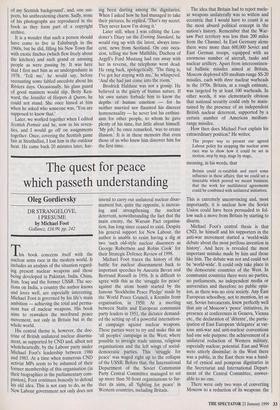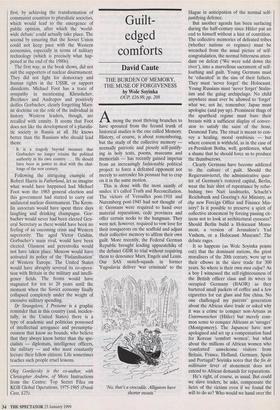The quest for peace which passeth understanding
Oleg Gordievsky
DR STRANGELOVE, I PRESUME by Michael Foot Gollancz, £16.99, pp. 242 This book concerns itself with the nuclear arms race in the modern world. It includes an analysis of the situation regard- ing present nuclear weapons and those being developed in Pakistan, India, China, Iran, Iraq and the former USSR. The sec- tions on India, a country the author knows and loves well, are especially interesting. Michael Foot is governed by his life's main ambition — achieving the total and perma- nent ban of nuclear weapons. His book aims to reawaken the moribund peace movement, not only in Britain but in the whole world.
His central theme is, however, the doc- trine of British unilateral nuclear disarma- ment, as supported by CND and, albeit not wholeheartedly, by the Labour party under Michael Foot's leadership between 1980 and 1983. At a time when numerous CND activist MPs seem to be ashamed of their former membership of this organisation (in their biographies in the parliamentary com- panion), Foot continues honestly to defend his old idea. This is not easy to do, as the New Labour government not only does not intend to carry out unilateral nuclear disar- mament but, quite the opposite, is increas- ing and strengthening the nuclear deterrent, notwithstanding the fact that the main enemy, the Warsaw Pact organisa- tion, has long since ceased to exist. Despite his general support for New Labour, the author is unable to resist having a dig at two 'such old-style nuclear disarmers as George Robertson and Robin Cook' for their Strategic Defence Review of 1998.
Michael Foot traces the history of the battle for nuclear disarmament back to important speeches by Aneurin Bevan and Bertrand Russell in 1956. It is difficult to agree with this as the 'struggle for peace' against the atom bomb started by the famous 'Stockholm Peace Pledge' made by the World Peace Council, a Kremlin front organisation, in 1950. At a meeting between Stalin and European communist party leaders in 1951, the dictator demand- ed the setting up of a powerful internation- al campaign against nuclear weapons. These parties were to try and make this an `all peoples' campaign in the West; where possible to inveigle trade unions, religious organisations and the left wings of social- democratic parties. This 'struggle for peace' was waged right up to the collapse of the USSR Before that, the International Department of the Soviet Communist Party Central Committee managed to set up more than 50 front organisations to fur- ther its aims, all 'fighting for peace' in Western countries, including Britain. The idea that Britain had to reject nucle- ar weapons unilaterally was so witless and eccentric that I would have to count it as the most absurd political concept in the nation's history. Remember that the War- saw Pact territory was less than 200 miles from the Channel. In East Germany alone there were more than 600,000 Soviet and East German troops, equipped with an enormous number of aircraft, tanks and nuclear artillery. Apart from intercontinen- tal ballistic missiles aimed at Britain, Moscow deployed 650 medium-range SS-20 missiles, each with three nuclear warheads in the 1970s. Britain, at a rough estimate, was targeted by at least 100 warheads. In other words, it was elementarily obvious that national security could only be main- tained by the presence of an independent British nuclear deterrent, supported by a certain number of American medium- range missiles.
How then does Michael Foot explain his extraordinary position? He writes:
The proper way to present our agreed Labour policy for stopping the nuclear arms race was to show how it could be set in motion, step by step, stage by stage,
meaning, in his words, that
Britain could re-establish and exert some influence in these affairs; that we could set a timetable which proved we meant business; that the work for multilateral agreements could be combined with unilateral initiatives.
This is extremely unconvincing and, most importantly, it is unclear how the Soviet Union could have been persuaded to fol- low such a move from Britain by starting to disarm.
Michael Foot's central thesis is that CND, he himself and his supporters in the anti-war movement started a 'world-wide debate about the most perilous invention in history'. And here is revealed the most important mistake made by him and those like him. The debate was not and could not be 'world-wide'. It could only take place in the democratic countries of the West. In communist countries there were no parties, no parliaments, no independent media or universities and therefore no public opin- ion, as there was no civic society. Any East European schoolboy, not to mention, let us say, Soviet bureaucrats, knew perfectly well that any of Moscow's 'peace' initiatives, its presence at conferences in Geneva, Vienna etc., the declaration of 'détente', the partic- ipation of East European 'delegates' at var- ious anti-war and anti-nuclear conventions had one sole purpose: the achievement of a unilateral reduction of Western military, especially nuclear, potential. East and West were utterly dissimilar: in the West there was a public, in the East there was a hand- ful of cynical and pompous dignitaries in the Secretariat and International Depart- ment of the Central Committee, answer- able to no one.
There were only two ways of converting Moscow to a reduction of its weapons: the first, by achieving the transformation of communist countries to pluralistic societies, which would lead to the emergence of public opinion, after which the 'world- wide debate' could actually take place. The second by ensuring that the Soviet Union could not keep pace with the Western economies, especially in terms of military technology (which is precisely what hap- pened at the end of the 1980s).
The first way, as the book shows, did not suit the supporters of nuclear disarmament. They did not fight for democracy and human rights in the USSR, or support dissidents. Michael Foot has a trace of sympathy in mentioning Khrushchev, Brezhnev and Andropov and positively deifies Gorbachev, clearly forgetting Marx- ist doctrine on the role of the individual in history. Western leaders, though, are recalled with enmity. It seems that Foot does not like the development of a pluralis- tic society in Russia at all. He knows better than the Russians who should lead them: It is a tragedy beyond measure that Gorbachev no longer retains the political authority in his own country . . . He should have been in power to deal with the chal- lenge of the new century.
Following the intriguing example of Robert Harris in Fatherland, let us imagine what would have happened had Michael Foot won the 1983 general election and this government had started to carry out unilateral nuclear disarmament. The Krem- lin autocrats would have spent three days laughing and drinking champagne. Gor- bachev would never had been elected Gen- eral Secretary as there would have been no feeling of an oncoming crisis and Western superiority. The aged Victor Grishin, Gorbachev's main rival, would have been elected. Glasnost and perestroika would not have taken place. Moscow would have activated its policy of the 'Finlandisation' of Western Europe. The United States would have abruptly severed its co-opera- tion with Britain in the military and intelli- gence fields. The fronts would have stagnated for ten to 20 years until the moment when the Soviet economy finally collapsed completely under the weight of excessive military spending.
Dr Strangelove, I Presume is a graphic reminder that in this country (and, inciden- tally, in the United States) there is a type of academic and politician possessed of intellectual arrogance and presumptu- ousness that know no bounds, who believe that they always know better than the spe- cialists — diplomats, intelligence officers, the military — and who must constantly lecture their fellow citizens. Life sometimes teaches such people cruel lessons.
Oleg Gordievsky is the co-author, with Christopher Andrew, of More Instructions from the Centre: Top Secret Files on KGB Global Operations, 1975-1985 (Frank Cass, £25).



























































 Previous page
Previous page